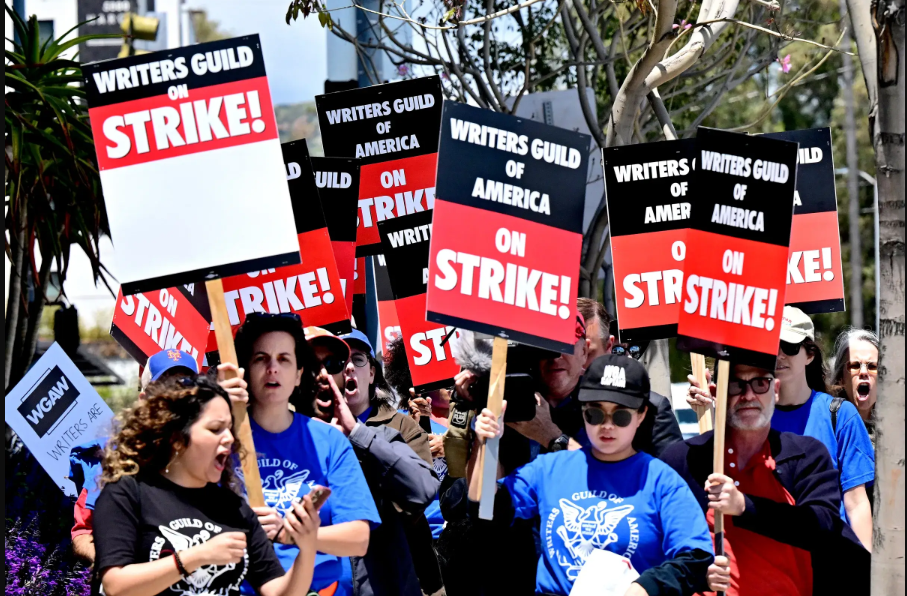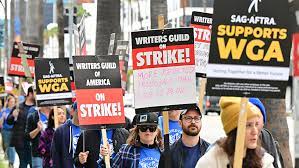In the heart of Hollywood, a storm is brewing. The Writers Guild of America (WGA) strike has gripped the American entertainment industry, sparking debates and bringing to the forefront the fundamental issue of creative rights. As the clash between writers and production companies escalates, the strike’s impact is reverberating across the nation, affecting not only the entertainment landscape but also raising profound questions about the value we place on creative work and the rights of those who bring our favorite stories to life.

The Struggle for Fair Compensation
At its core, the WGA strike is a fight for fair compensation and recognition of the creative contributions made by writers. Screenwriters, TV showrunners, and other storytellers are the backbone of the entertainment industry, crafting narratives that captivate audiences and shape our cultural landscape. However, many writers feel that their work is undervalued and undercompensated, particularly in the era of streaming platforms and evolving distribution models.
One of the key grievances revolves around the issue of residuals, which are payments made to writers for the reuse or syndication of their work. The rise of streaming services has transformed the way content is consumed, and writers argue that the current residuals structure fails to adequately account for the increasing prevalence of online streaming. They contend that as their work continues to generate revenue through multiple platforms, they deserve a fair share of the profits.
Additionally, writers are demanding more reasonable and equitable compensation for the increasingly demanding workloads imposed on them. With shorter production schedules, tighter deadlines, and increased pressure to deliver high-quality content, writers are seeking better protections to ensure their physical and mental well-being. The push for comprehensive health benefits, reasonable working hours, and adequate rest periods has become a crucial component of their battle for fair treatment.
The Fight for Creative Control
Beyond monetary concerns, the WGA strike also underscores the writers’ desire for greater creative control over their work. In recent years, showrunners and screenwriters have experienced an erosion of their authority as studios and networks exert more influence over storylines, casting decisions, and overall creative direction. This struggle for creative autonomy is an essential aspect of the strike, as writers advocate for their vision to be respected and protected.
Writers argue that the commodification of storytelling compromises artistic integrity and hampers the ability to produce truly innovative and meaningful content. By regaining control over their work, writers believe they can revitalize the industry and restore its commitment to storytelling excellence. They emphasize the importance of recognizing writers as the primary architects of narratives and enabling them to fulfill their creative potential.
The Industry Impact and Public Perception
The ongoing WGA strike is not just a matter confined to writers and production companies; it has a far-reaching impact on the entire entertainment industry. The disruption in the release of new content, including films, TV shows, and streaming series, leaves a void in the entertainment landscape. Viewers, already accustomed to a constant stream of engaging content, are feeling the effects as production delays and cancellations become more prevalent.

While some industry insiders express concerns over the strike’s potential long-term effects, others argue that the temporary disruption may be a necessary catalyst for change. As the strike garners media attention and public support, it serves as a wake-up call, forcing a critical examination of the value we assign to creative labor and the rights of those who bring stories to life.
The ongoing Writers Guild of America (WGA) strike has had a significant industry impact and shaped public perception in multiple ways. As the strike continues to unfold, its consequences are being felt across the entertainment landscape, influencing various stakeholders and prompting discussions about the value of creative work and the rights of writers.
1.Disrupted Production and Release Schedules.
One of the immediate and tangible effects of the WGA strike is the disruption of production and release schedules. TV shows, films, and streaming series face delays, episode reductions, or even cancellations due to the absence of essential writing staff. This has resulted in a dearth of fresh content, leaving audiences hungry for new experiences and affecting the revenue streams of production companies and streaming platforms.
2.Economic Impact.
The strike’s economic impact extends beyond immediate production losses. The entertainment industry serves as a significant contributor to local economies, providing jobs and generating revenue through various means such as tourism, advertising, and ancillary merchandise. The prolonged strike has a trickle-down effect on related businesses and workers, from caterers and set designers to marketing agencies and talent agencies, amplifying its economic repercussions.
3.Public Awareness and Support.
The WGA strike has garnered public attention, raising awareness about the underlying issues faced by writers and their fight for fair treatment. Through media coverage, social media campaigns, and public demonstrations, the strike has drawn attention to the crucial role of writers in shaping the stories we love. As audiences become more informed about the challenges faced by writers, they have increasingly expressed support for their cause, demanding fair compensation and improved working conditions.
5.Artistic Freedom and Creative Control.
The strike has prompted discussions about the balance between artistic freedom and the influence of studios and networks in shaping creative content. Writers are advocating for greater creative control over their work, emphasizing the need for their visions and voices to be respected. The strike has sparked debates about the impact of corporate interests on storytelling and the importance of fostering an environment that allows writers to explore innovative narratives and maintain artistic integrity.
6.Industry Transformation and Negotiations.
The WGA strike has set the stage for potential industry transformation. As negotiations between the writers’ union and production companies continue, the outcome of this strike will likely shape the future landscape of the entertainment industry. The resolution reached, whether it involves significant concessions or groundbreaking agreements, may set new precedents for fair compensation, creative rights, and the relationship between writers and studios.
The WGA strike in America serves as a powerful reminder of the essential role writers play in shaping our entertainment experiences. It is a collective call for fair compensation, improved working conditions, and the preservation of creative control. The outcome of this battle will not only impact the lives of writers but also shape the future of the entertainment industry as a whole.
The WGA strike’s industry impact and public perception are closely intertwined. As the strike disrupts production schedules, affects local economies, and captures public attention, it highlights the critical role writers play in the entertainment ecosystem. It also invites broader discussions about fair compensation, creative autonomy, and the need to value creative labor. The ultimate resolution of the strike will undoubtedly shape the future trajectory of the industry and the treatment of writers in the years to come.